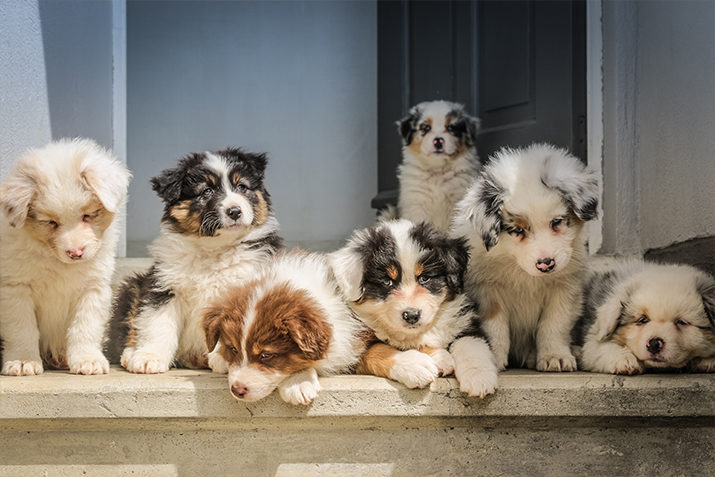
Once you’ve decided to get a pet, it’s important to find the most child-friendly dog breed for your family. To find the best dog, consider your family’s lifestyle, wants, and needs. If you have a newborn in the house, you’ll want the best dog breed for babies. If you live an active lifestyle, you’ll want a playful pet that can go with you on adventures.
Take some of these questions into consideration: Do we want a small or big dog? Do we need an energetic or mild-tempered dog? Which dog breed is best for small children? Although finding a pet can be a lengthy process, it’s also fun and rewarding to add a furry friend to your family!
Dogs can teach kids about compassion, responsibility, and teamwork. These lovable pals are perfect playmates for your kids, offering comfort and unconditional love. Add some floofy love to your home and find the best family dog. And when you’ve found your pet, create a personalized dog book that has your dog’s pictures and kids’ names in the story!
To help you find the perfect pup for your growing family, we interviewed veterinarian Dr. Laura Ferris. Dr. Ferris answers our questions about which dog breeds may be right for your kids and your family situation. See our Dogs for Kids Guide below and give thoughtful consideration to finding your future pet!
How to Find the Best Dogs for Kids and Families

What factors should families consider when looking for a dog?
There are many different factors to consider when choosing a dog breed that is right for you and your family. Dr. Laura Ferris explains what families should think about before adding a furry friend to their home.
Factor #1: Will your pet fit your living situation?
According to Dr. Ferris, “One of the first things to consider is where you live. Do you live in an apartment or a house? If you live in a small apartment, you may want to avoid the more active breeds such as the retrievers or shepherds and consider the more “couch potato” breeds that require less exercise such as the Cavalier King Charles Spaniel. Barking is a consideration also. While any dog has the capacity to bark, breeds such as the English bulldog or the Boston Terrier tend to be quieter.”
Factor #2: Can you accommodate a dog’s activity needs?
Another consideration, according to Dr. Ferris, “is if you have access to an exercise area for your dog. Do you have a large fenced in yard or do you live in the middle of a city?
Think about your lifestyle right now and how much time will you have to devote to your dog. Certain breeds such as the Border Collie, Australian Cattle Dog, the German Shepherd, and the Golden Retriever will need lots of exercise, while other breeds such as the Bichon Frise, Dachshund, and Maltese do not need as much.”
Factor #3: Will this pet fit your lifestyle?
Think about your own experience with pets and what is best for your family. When choosing a dog breed, be mindful of how this dog will fit into your day-to-day routine. Ask yourself these questions from veterinarian Dr. Ferris: “Are you an experienced dog owner? Do you have any other pets in the house (cats, dogs, bird, critters?) Think about the personality of the dog you would like. Do you want a dog that will be protective, friendly with strangers, or friendly with everyone? If you are the parent of a small child, consider a dog that is more friendly with everyone.”
Factor #4: Can you commit to a dog’s needs and pet costs?
Dr. Laura Ferris notes that a dog’s upkeep, including food and veterinary care, is one of the most important factors to consider. “A Great Dane eats quite a bit more food than a Chihuahua! Research potential health risks associated with each breed and be sure you are prepared to handle the cost of veterinary care when it is needed. Grooming costs and at-home grooming care should be considered also. Several breeds such as the German Shepherd, Siberian Husky, and even the Pug have reputations for being quite the shedders. While most dogs shed, you may want to look for a breed with a shorter coat if you want to deal with less amounts of fur. You could even consider a hairless breed like the Chinese Crested or the Xoloitzcuintli!”
How to research the best dog for your family
Choosing the right dog for your family is a huge decision. Luckily, there is tons of information online to help you in your search. Some useful websites are:
- www.akc.org/dog-breeds/
- www.iams.com/breedselector/
Your local animal shelter also is a great source of information. Many pure-bred dogs can be found at your local shelter.
Child-friendly dog breeds
There are hundreds of dog breeds out there. So how do you choose the right breed for your family? According to Dr. Ferris, “No dog should ever be trusted completely alone with a baby or young child, but some great family friendly dog breeds are the retrievers, such as the Labrador or Golden Retriever. Other good family breeds are the Beagle, Boxer, Pug, Staffordshire Terrier, and Boston Terrier. If you are looking for a smaller dog, Cavalier King Charles Spaniels are known to be particularly affectionate dogs. Avoid breeds such as the Chow Chow. This breed typically doesn’t enjoy cuddling or interacting with strangers and may not tolerate living with small children.”
Dogs for the family with an active lifestyle
Dr. Ferris recommends that active families choose a dog with a high energy level—one that requires a significant amount of exercise. Consider the Border Collie, Pointer, or retriever breeds. Try an out-of-the-ordinary dog breed and consider the Nova Scotia Duck Tolling Retriever—a great smaller hunting dog!
Dog breeds for the family that loves to travel
If your family loves to embark on adventures and travel, you may want to consider a more independent dog that does well on its own—either in a kennel or with a house sitter. Dr. Ferris recommends the Boston Terrier, Lhasa Apso, or Schnauzer. There are also some breeds you may want to avoid. “While any dog can suffer from separation anxiety, “Dr. Ferris notes, “breeds that tend to be more prone to it are Poodles and the Australian Shepherd.” For families that travel by car or airplane, consider smaller dog breeds because they fit more easily in a carrier.
Best dog breeds for a scared child
If your child fears dogs, Dr. Ferris recommends adjusting your child to being around dogs first—before you adopt a pet from a shelter or breeder. But even this introduction must be done carefully and thoughtfully. Dr. Ferris explains, “Introducing a dog to your house with a scared child may backfire and could actually increase your child’s fear. Consider ‘borrowing’ a dog for a weekend, such as pet-sitting a family member’s or friend’s dog.” It’s also best to start with a mellower, older dog—one that is less likely to be rambunctious and jump or bark. When your family is finally ready to get a dog, consider one of the child-friendly breeds we listed earlier.
Whether you are looking to get a dog around National Dog Day or any time of year, consider all of these factors to find the best dog for your family!
Dr. Laura Ferris is a veterinarian at All Pets Animal Hospital in Columbia Heights, Minnesota.


